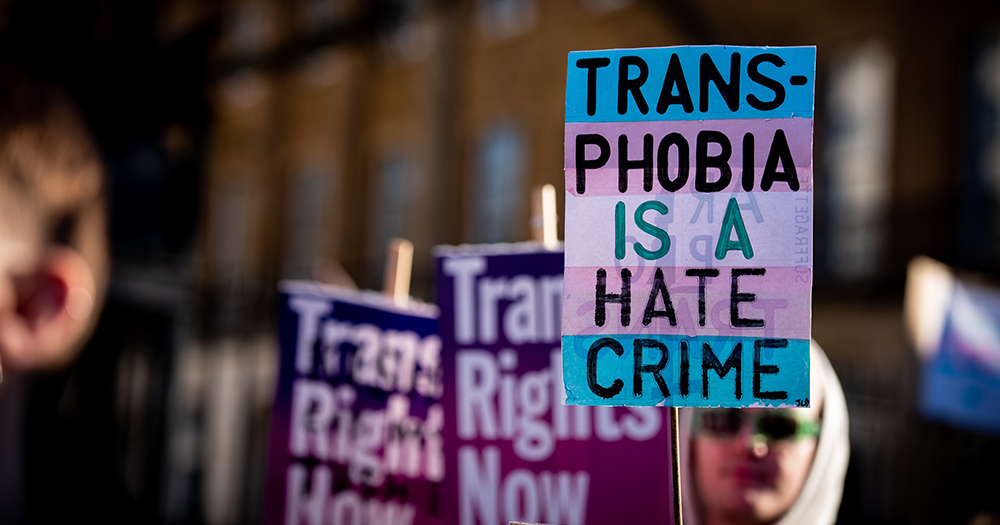After announcing that the hate speech provisions of the bill would be abandoned, the Irish Department of Justice has confirmed that the hate crime legislation will retain protections for trans and non-binary people.
Earlier this week, Minister for Justice Helen McEntee confirmed that her Department was shelving plans to introduce new hate speech provisions in Irish law after they garnered criticism from several parties. Instead, the government will proceed with the hate crime proposals only, with plans to bring the legislation to the Dáil in the coming weeks.
If it becomes law, the bill will allow tougher sentences for existing criminal offences in cases where such offences are motivated by prejudice against a victim’s “protected characteristic”. The list of “protected characteristics” includes race, colour, nationality, ethnic or national origin, sexual orientation, gender (which will also include gender identity and expression) and disability.
In its definition of gender, the proposed law accounts for “the gender of a person or the gender which a person expresses as the person’s preferred gender, or with which the person identifies, and includes transgender and a gender other than those of male and female”.
This part of the bill garnered criticism in past debates, with some TDs expressing opposition to the fact that the definition includes genders other than male or female. However, speaking to The Irish Times, a spokesperson for the Department of Justice confirmed that despite these pressures, the hate crime legislation will retain the above definition and thus protect trans and non-binary people as well.
“If someone is assaulted because they are transgender, that is a hate crime,” the spokesperson said. “People identify as non-binary. That’s a fact.
“If someone follows a non-binary person after they leave a gay nightclub, and then assaults them while shouting homophobic abuse, they would likely be charged with assault causing harm aggravated by hatred (carrying a max sentence of 12 years, instead of 10 years because of the aggravating factor).
“If it’s not found that it has been aggravated by hatred, then the person could still be charged with assault causing harm,” the spokesperson continued. “A definition is required to protect that person. It has absolutely no implications outside of this law.”
In the past few days, members of the LGBTQ+ community and other minority groups have criticised the government’s decision to alter the bill and drop its hate speech element. The Coalition Against Hate Crime said in a statement: “While we feel this is a missed opportunity to strengthen legislation on extreme hate speech, we nonetheless welcome their commitment to pass the hate crime sections of the legislation.”
The Pavee Point Traveller and Roma Centre have also expressed disappointment about the government’s decision. Co-director Martin Collins said: “While it’s important the government go ahead with hate crime legislation, it has been shown that hate crime increases with hate speech. Scrapping stronger hate speech laws really represents a lost opportunity to prevent hate crime and protect communities.
Collins concluded, “The fact that more effective and much needed hate speech legislation has been sacrificed to the political realities of a populist backlash largely played out in the media — and a looming general election — is concerning. It raises questions about the values we promote in our society.
“We believe that in general people want a society free from fear and intimidation for everyone — including groups that experience discrimination such as women, the LGBTQ+ community, people with a disability and minority ethnic groups including Travellers and Roma. This government has, sadly, failed to deliver on this.”
© 2024 GCN (Gay Community News). All rights reserved.
Support GCN
GCN is a free, vital resource for Ireland’s LGBTQ+ community since 1988.
GCN is a trading name of National LGBT Federation CLG, a registered charity - Charity Number: 20034580.
GCN relies on the generous support of the community and allies to sustain the crucial work that we do. Producing GCN is costly, and, in an industry which has been hugely impacted by rising costs, we need your support to help sustain and grow this vital resource.
Supporting GCN for as little as €1.99 per month will help us continue our work as Ireland’s free, independent LGBTQ+ media.
